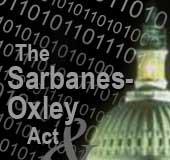
THE Sarbanes-Oxley Act, enacted in mid-2002 in the wake of the Enron and WorldCom accounting scandals, aimed to improve the accuracy and reliability of corporate financial disclosures.
This objective may have been at least partly achieved, but a new study has found that the legislation may have had a serious side effect: It appears to have made Wall Street analysts less able to forecast corporate earnings.
Sarbanes-Oxley is complex legislation, containing an assortment of features. One is stiff fines and penalties for reporting misleading financial data; the law requires that a company’s chief executive and chief financial officer personally certify the accuracy of its financial statements. Sarbanes-Oxley also made a number of changes to corporations’ governance structure, like requiring that the board’s audit committee be independent and that the outside auditor have no conflicts of interest.
The study, titled “The Impact of the Sarbanes-Oxley Act on Information Quality in Capital Markets,” set out to document some of the law’s effects. Its authors are Joy Begley, an associate professor of accounting at the University of British Columbia in Vancouver; Qiang Cheng, an assistant professor of accounting there; and Yanmin Gao, an assistant professor of accounting at the University of Alberta in Edmonton.
See full Article.



